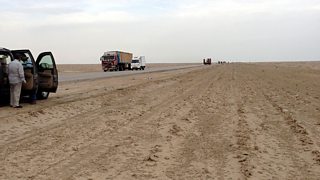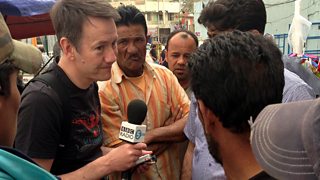As we head down the highway to Basra for the second part of this trip, I'm reflecting on all we've seen and heard these past few days in Baghdad. There's a lot for the mind to process.

Our final day in the city saw 14 car bombs explode, a suicide attack and multiple IEDs. , mainly in Baghdad, but in other parts of Iraq too. It was the worst loss of life in this country for听six months. We didn't witness any of this terrible destruction, but we were close enough to hear the loud thud of the last car bomb of that deadly sequence. It happened minutes after our live broadcast听into the Breakfast programme from Firdos Square - the square where the Saddam Hussein statue was toppled in April 2003, effectively signifying the end of his rule.
Think of the听7/7听attacks in London, and the profound impact those had on our country. Now imagine killings on that scale, month after month, 听year after year, seemingly without end, and you begin to imagine how life might be for Iraqis. The sense of fear, the not knowing whether your journey to work, or trip to the market, might be your last.
You see and feel the tension in the number of checkpoints across Baghdad. Those who were here in the worst years of sectarian violence - in 2006 and 2007 - tell me there are actually fewer checkpoints now, but to someone visiting for the first time they really stand out. And the number of police and army officers on the streets is also striking. One of the people we interviewed told us that there are now three times as many security forces as under Saddam Hussein, but security remains elusive.听
The official figures suggest Iraq's economy is booming - growth is around 10 per cent and oil production is now above pre-war levels and projected to rise sharply in the future. Looking around, not much of that appears to have filtered down听- the majority of people are poor and much of the infrastructure is rundown. There are definitely pockets of wealth though. We visited a shiny new GM dealership selling top of the range Cadillacs. The manager told us business was good and with increased oil revenues he was confident there would soon be more people able to buy his cars.
听
Of course, the protection and safety we're afforded isn't on offer for the vast majority of Iraqis. People like Naji, for example, an unemployed labourer we spoke to on a street corner. With his friends - also searching for work - gathered around him, he told us how he'd been the victim of a roadside bomb. He then showed us the scars and badly healed bones in his leg.
He wasn't the only person we met who's been physically and emotionally wounded by the events of the past 10 years.听
Layla, a woman now in her late 50s, showed us her shattered front teeth - the result of a vicious assault by members of one of the militia groups which emerged during the worst of the sectarian violence. As well as being physically attacked, she was forced out of her home, which was then used as a base by the militia. She's since returned, but the way she broke down when telling us what had happened to her suggested the scars may never heal.
Muqdad's life will certainly never be the same. Now 25, he learnt听English from selling DVDs to听American soldiers in听Baghdad. He became an interpreter for coalition forces for 2 years. That made him a target and he was kidnapped twice by militia groups and tortured. The scars from electricity burns were clearly visible on his arms. His family was forced to pay a 拢16,000 ransom. After those ordeals, things got even worse when his wife - who he'd married just 6 months before - and several members of her family were murdered by militia.

Reporter James Shaw and producer Liam Hanley are in Iraq marking ten years since the US led invasion to听.
